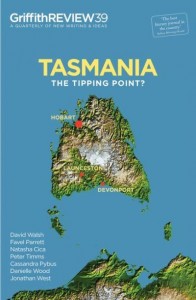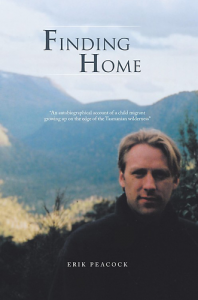Review: Tasmania – The Tipping Point?
 The hardcopy sold out in Hobart, apparently. Tasmania – The Tipping Point? an entire Griffith Review devoted to discussing the past and present character, and the consequential future of Australia’s small state. My home state.
The hardcopy sold out in Hobart, apparently. Tasmania – The Tipping Point? an entire Griffith Review devoted to discussing the past and present character, and the consequential future of Australia’s small state. My home state.
This Review edition is a mixture of academic essays, memoirs, historical narrative, and some fictional pieces. They are of inconsistent quality and relevance but mostly good.
Jonathan West’s essay Obstacles to Progress: What’s wrong with Tasmania, really? has been held up as the shiniest gem in this particular conglomerate. I read it with interest. It certainly has some value, but I did not come across any novel thought. Tasmanians have an ingrained underachievement, West intones, and somehow we need to get over that. The analysis has merit – the prevalence and power of interest groups for instance. The topic that has gained most interest, however, is our so-called “bogan problem” – the significantly large welfare-dependent populace. West wants to turn off welfare resource provision, to induce a starvation-induced productivity that will change the culture. It might be an effective idea. I don’t know if it’s a good one though.
If you are an outsider wanting an insight into the ills of Tasmania just read Danielle Wood’s Hotel Royale on Liverpool, a personal account of her battles with the public health system. I too know what this is like, having spent much time in the Royal Hobart Hospital (The “Hotel Royale”) sitting next to my wife’s bed. Wood’s description is no exaggeration
At the Royal there is not enough of anything to go around: not enough doctors, not enough nurses, not enough supplies, not enough elective surgeries, not enough energy, not enough hours in the day
Wood wrote her piece before the 2011 health cuts and acknowledges this fact, wondering how it could get worse. In 2012 my wife spent six months waiting for category one surgery. Wood’s fears were founded.
There is a huge amount of reading in this Review. I enjoyed the historical accounts and the anecdotal snippets of places with which I am familiar. It made me feel, well, at home. In the more esoteric sense, however, it was the words of Rodney Croome who best distilled the Tasmania I know and love.
Tasmania is a fracture and polarised society with a weak middle ground. It moves forward by the grinding of fault lines against each other. Unfortunately this sometimes produces great heat and instability, but it offers far more to the world as a result. Tasmania is neither entirely conservative nor predictably progressive. If it were, it could not have made its great and original contribution to the nation and the world. Tasmania is both the abominable Fatal Shore and the felicitous Apple Isle, together at the same time. The fact that such a paradox can exist in the heart of a single people and place is not easy to grasp. But without at least attempting to grapple with Tasmania’s contradictions, the island remains impossible to explain.
Not that I agree with his definition of marriage, but then that’s a fault line, isn’t it?
The enigmatic, microcosmic, necessarily familial nature of Tasmanian society is alluded to throughout. In Tasmania, when it comes to the principled things in life – politics, economics, and applied philosophy – there is no room to retreat to comfortable ground for the occasional sortie; Tasmania is where “opponents” meet at the shops and nod to each other in the mall. Tasmanian society operates like one big awkward family dinner, in which disagreements find truces in awkward silences, after flurries of “you just don’t understand!”
As in The West Wing‘s New Hampshire, politics, and everything else in Tasmania is “retail.” Weasel words don’t work down here in the long term because in Tasmania you can’t avert your gaze; you eventually have to look everyone in the eye. Relationships matter more than ideas and the idealist who forgets that will find Tasmania a place of loneliness, rejection, and even injustice.
But all in all Tasmania – The Tipping Point? frustrated me. Yes, I’m a bit proud of having had a whole edition devoted to Tasmania. In reflection, however, it’s the sort of pride that’s akin to child delighting in a MacDonald’s happy meal toy.
Above all I was frustrated because this Review is a one sided thing. It doesn’t feel right, it doesn’t feel very Tasmanian in the end. All I get is a whiff of Salamanca wine-sipping holier-than-thou lefty pontification. This isn’t the Tasmania that I know. This is wordy wordsmiths, artisans wrapping themselves up in a Peter Dombrovski picture, tying it with a rainbow ribbon and dousing it with the perfume of Huon Pine trinkets. I can almost hear the whistling toy birds of the Saturday market. As I read I had flashes of some oh-so-earnest sparkled eye’d gaze of the rebel-with-yet-another-cause ancient baby boomer at some bland tarkine-land-rights-climate-changing-equal-rights-for-gay-whales-saving-the-forests stall. Sometimes I agreed with her.
I don’t see the Tasmania in which Fords and Holdens are things of utmost importance. Where’s the miner, the farmer, the (former) pulp worker? Where’s the story of the kids in Triabunna, or Scottsdale, or Smithton who don’t see their dad because the only trucking job is on the mainland? Where’s the bloke who does his best to drain the oil in his own car because he can’t afford the service? Where’s the kids excited about going 4WDing in the bush block, the girl who has spent more days in a jeans and ugg-boots than tye-die and dreds? The boy who learns to skin a rabbit but isn’t allowed to learn to shoot the gun any more? Where’s the Tasmania of Phil Maney pies, Boags beer on tap? Where’s the single mum scraping vegemite onto a cracker for school lunch? Or the kid who does it because the parents are stoned in bed? Or the dad with his kids doing brekky at Maccas on “his” Saturday morning?
Even the half-normal David Walsh is only in there because he started MONA. D*mn bl**dy MONA! On every other page was some rambling ode to this wonderful MONA as if Tasmania has at last come into its own. The Tasmanians I grew up with would appreciate MONA; but only because it was some punter getting around the tax department by buying a bunch of crap that involved naked chicks.
I appreciated Edition 39 of the Griffith Review. It learned me a lot and it got me some thinking. But its a bit of a wank really. A bit like the State Government at the moment: Nostalgia mixed with spin coated with a thin film of supposed academic credibility. Nice words, some good light entertainment.
But now we need to get on with life.

